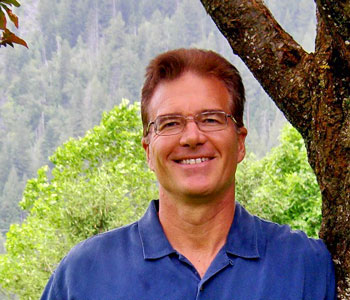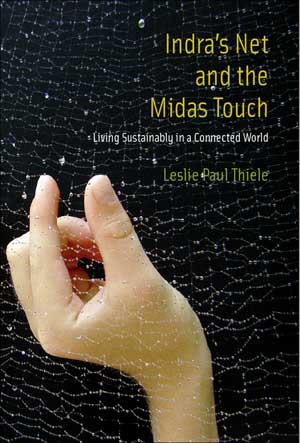
Sustainability is all the rage these days. It is espoused by government agencies from the local to the national, by international bodies, and by proliferating citizens’ groups and non-governmental organizations. It is being incorporated into existing academic programs and defines wholly new ones (like the one I direct). And it shapes business practices, from the community affairs of local grocers to the mission statements of Fortune 500 companies. Sustainability is widely championed today as a core value. At times bona fide commitment, at times greenwashing PR or a curtsey to trendiness, sustainability is very much in the news, in advertising, in our homes and offices, and on the streets.
For two decades now, sustainability has been defined as the effort to meet social, environmental, and economic needs without undermining the capacity of future generations to meet their own needs. It addresses the question of how we can pursue the good life without this pursuit burdening progeny with debt and devastation. Living as we do in nations drowning in debt under skies thickening with greenhouse gases, the prospects for future generations appear rather glum. If sustainability is just the flavor of the day, we can be guaranteed, given the breadth and depth of the crises we face and the relatively meager efforts to address them thus far, that it is going to be a very, very long day.
For all the time and effort spent addressing why we are in such dire straits, there has been little in the way of reflection on the sort of world that makes sustainability a compelling value, and likely a central value for the foreseeable future. I argue that there are two fundamental reasons why we live at a time where the pursuit of sustainability is fast becoming the core commitment of government, civil society, householders, and business, and, at the same time, remains a Sisyphean task. First, our lives are increasingly defined by relationships of interdependence. Never before have so many individuals, organizations, and fields of activity been so complexly connected. Second, and as a consequence of these expanding and deepening webs, the “law of unintended consequences” has gained an unprecedented jurisdiction. Today, it reigns across the scope of our lives, and presents the gravest of threats.
Some readers might appreciate the book as a primer in sustainability theory and practice. I mean it to be more than that. My effort has been to illustrate how interdependence has become the most salient feature of our lives, and how unintended consequences, in such a world, both threaten civilization and offer great promise.
It is perhaps already trite, these days, to observe that we live in a world chiefly defined by interdependencies. But it wasn’t always so.
Until the “age of ecology,” ushered in by Aldo Leopold and Rachel Carson, the notion of our living within a web of interdependent relations was foreign, at least to the Western mind. But as the impact of natural resource depletion, pollution, escalating populations, and technological quick-fixes came back to haunt us in the latter half of the 20th century, perspectives shifted. We discovered that the natural world was not an inexhaustible pile of resources available for consumption, a pyramid of plenty upon which humankind might safely perch itself. Rather, we existed—as one among many co-habitant species—in a finite world, within a delicate and complex network of relationships. Sustaining this web of life took on a new urgency as the effects our overloading, or severing, one strand after another began to hit home.
If environmental threats prepared us to think anew about our place within nature, vast changes in the human world simultaneously reinforced the salience of interdependence as the ubiquitous feature of contemporary life. Since the end of the Second World War, economic interdependencies grounded in a global economy have proliferated and deepened. Today, virtually everything we do—and certainly everything we buy—reinforces our status as local links on global supply chains and global chains of demands. That economic interdependency defines our world today need hardly to be emphasized, as the painful reverberations of the collapse of Wall Street in the fall of 2008, and the Euro zone debt crisis of 2011, still ricochet across the globe.
Likewise, our lives are entwined within vast technological networks. New media and engineering innovations encircle the globe at lightening speed, gaining footholds, and market share, among widespread publics who are willing, if not eager, ever to adjust their lives to newer, faster, smaller, bigger, cheaper, more complex, and more costly artifacts and capabilities. We are technologically linked as never before. The realms of culture, society and politics are no different. They, too, demonstrate the ever-increasing interdependencies of our lives—evident in such global chain reactions of social and political upheaval as the Arab Spring and the proliferating Occupy Wall Street/We are the 99 movement.
But if the vast and accelerating growth of global interdependencies has become duly acknowledged, the chief repercussion of our ecological, economic, technological, social, political and psychological connectivity has been more routinely ignored. The stubborn, and tragic truth is that navigating systems defined by interdependence inevitably produces unintended consequences, and the deeper the interdependencies, the more impactful—and potentially devastating—the by-products of action.
I wrote this book because I wanted to have a response to the questions my students were asking about the complex world they are inheriting. Indra’s Net and the Midas Touch provides an interdisciplinary account of the nested connections that define our lives.
After much delay, there is in my own country widespread acknowledgement that global warming is real and human-caused. That is a welcome development. Still, to admit that we have engineered the greatest change to the atmosphere, and potentially to the biosphere, that the earth has seen in the last half million years, is to obscure a still more potent truth.
To be sure, humankind is a powerful force on this planet. As a species, we are game changers. But the more important acknowledgement is that our potentially irreversible alteration of natural cycles and planetary conditions has been an unintended consequence. Like overpopulation, pollution, and the loss of biodiversity, climate change is a side effect. It is the unforeseen result of our consumption of fossil fuels and forests. The most menacing and pressing problems that we face today, the things that undermine prospects for our progeny, are by-products.
Climate change presents an unparalleled crisis. It is difficult to overstate the magnitude of the problem—and likewise, the opportunity—it presents. Still, the more daunting challenge is to come to grips with a simple truth: we can never do merely one thing. And it is the things that we unintentionally do that now come back to haunt us with a vengeance.
In this light, to confront climate change, or any other environmental issue, as a problem to be bested by human ingenuity is to commit a fateful error.
I don’t want to be misunderstood here. We need to combat climate change—as well as pollution, species extinction, resource depletion, and overpopulation—with greater urgency. And technology can and should be a powerful ally. But the only sustainable means of addressing such dire concerns, for net-dwellers like us, is through a fundamental transformation of what it means to solve problems.
Today we find ourselves grappling with the unintended consequences of actions that were once proffered as answers. That is to say, most of our current problems are the legacy of former solutions. Typically, they were solutions to some specific problem that was itself the unintended consequence of an earlier solution. As the myth of Midas testifies, the human race has been playing at this game for thousands of years. The legendary King Midas had his wish granted that everything he touched be transformed into gold. But gaining unsurpassed riches had the unintended consequence of threatening his life, as every morsel of food touching his lips became petrified into indigestible metal.
Ironically, the story of Midas has itself received the Midas touch. It was meant as a forewarning of the unintended consequences of self-serving and shortsighted choices. But today when we attribute the Midas touch to an individual—typically in business affairs—we mean that this person has a knack for transforming opportunities into enduring economic success. Effectively, we have gilded the myth of Midas, conveniently ignoring its profound and disturbing moral.
Readers should not assume that Indra’s Net and the Midas Touch is an unhopeful book. The Midas myth urges caution and prudence, to be sure. But the myth of Indra’s net suggests why our interdependencies are full of promise.
Indra is the king of the Vedic deities. Over his palace, it was said, hangs a net that stretches in all directions to infinity. At each node of the net, where the gossamer strands intersect, hangs a beautiful jewel. And each facet of every jewel provides a reflection of all the other jewels. The ancient sages insisted that the jewels hanging from Indra’s net are not enduring substances. They do not have an essential nature. Rather, each jewel is the manifestation of relationships of interdependence. Each jewel exists only as the cavalcade of reflections to which it contributes.
All the strands of Indra’s net are connected. Sever one, and the whole is weakened. This is the upshot of interdependence. But the jewels on Indra’s net also mirror each other. They are, in the end, nothing but the aggregation of such reflections. Relationship, not an individual essence, is their core reality. My book is meant to illustrate how a growing awareness of our interdependence, understood as the core of our being, is the only viable means of sustaining ourselves and our world. I develop the notion of ecosophic awareness to denote a mindful attention to relations of interdependence and a hopeful investment in them.
Ecosophic awareness in a connected, changing world fosters adaptation. Sustainability, in the end, is not about the human race becoming the curator of a planetary museum. It is about our learning how to manage the rate and scale of change within economic, social, and ecological systems so as to maintain their core values and relationships. To be advocates of sustainability, we have to become midwives of the future.


Leslie Paul Thiele teaches political theory and serves as Director of Sustainability Studies at the University of Florida. His interdisciplinary research focuses on sustainability issues and the intersection of political philosophy and the natural sciences. His central concerns are the responsibilities of citizenship and the opportunities for leadership in a world of rapid technological, social, and ecological change. Besides Indra’s Net and the Midas Touch, featured on Rorotoko, his recent books include The Heart of Judgment: Practical Wisdom, Narrative, and Neuroscience (Cambridge 2006) and Working Toward Sustainability: Ethical Decision Making in a Technological World (co-authored, Wiley, 2011). Dr. Thiele is currently developing practical principles inspired by nature to guide individual lifestyles and organizational practices. The work is tentatively entitled “Nature’s Compass.”